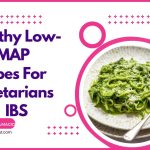Frequent Bowel Movements Shortly After Eating: 7 Causes Explained.
Our content is not intended nor recommended as a substitute for medical advice by your doctor. Use for informational purposes only.
Exaggerated bowel movement is a frequently reported complaint. the majority of cases are due to a condition called exaggerated gastro-colic reflex. However, some other diseases can cause such conditions.
Exaggerated bowel movements shortly after eating can be due to:
- Exagerated gastrocolic reflex.
- Irritable bowel syndrome (especially the diarrhea-predominant type).
- Undiagnosed food intolerances or allergies.
- psychological stress and anxiety.
- Fatty indigestion.
- A side effect of your medications such as metformin.
- Certain diseases such as bile acid diarrhea and hyperthyroidism.
1- Exagerated Gastro-colic reflex.
Gastrocolic reflex is a physiological mechanism that leads to increased colon motility shortly after eating.
The aim of this mechanism is to empty excess colon contents. This helps the colon to be able to receive the waste from the next meal.
Under normal conditions, the Gastrocolic reflex doesn’t cause bowel movement every time you eat. It only occurs if you didn’t have a bowel movement or ate a large meal.
However, Some people may experience some form of exaggerated gastro-colic reflex.
Exaggerated gastro-colic reflex is the most common cause of frequent bowel movement shortly after meals.
What causes an exaggerated gastro-colic reflex?
Possible triggers of exaggerated gastrocolic reflex are:
- Chronic psychological stress.
- Fat intolerance (fat indigestion).
- Eating Excess amount of food (more than your need).
- Coffee and caffeine in general.
- Exaggerated gastrocolic reflex is one of the theories of irritable bowel syndrome (especially the diarrhea-predominant type). (ref)
Studies show that gastrocolic reflex is mostly active in the morning and shortly after meals. (ref).
Exaggerated gastrocolic reflex is different from IBS. Abdominal pain is more severe and persistent with IBS.
With an exaggerated gastrocolic reflex, no or mild abdominal pain exists, and if present, it resolves completely after a bowel movement.
What to do if you think you have an exaggerated gastrocolic reflex?
Exaggerated gastrocolic reflex is generally a benign condition. Often, you will experience nothing more than frequent bowel movements shortly after eating.
Generally, the condition will only need some dietary modification to limit the reflex.
You need to see your doctor for the frequent bowel movements after eating if:
- You have significant diarrhea (watery stool, urgency, change the color, or the smell of the stool).
- Abdominal pain that is not going away after the bowel movements.
- Abnormal mucus or blood in the stool.
- unintentional weight loss related to the onset of frequent bowel movements.
- Nausea, vomiting, or any other unusual digestive symptoms.
- Known to have diseases that cause such conditions as Bile acid diarrhea, Hyperactive thyroid gland.
SEE GENERAL TIPS IN THE LAST PART OF THIS ARTICLE.
2- Irritable bowel syndrome.
Irritable bowel syndrome is a functional disease of the GI tract. It is a very common disease worldwide affecting 15-20 of the world population. (ref).
Surprisingly, Not all people matching the criteria of IBS seek medical advice. So, you may have IBS and you don’t know.
IBS is characterized by a long history of abdominal pain and other symptoms related to bowel movements.
According to the ROME IV criteria for IBS diagnosis, IBS is diagnosed when:
- Abdominal pain for at least one day per week for the past 3 months.
- The onset of abdominal pain should be at least 6 months.
- The abdominal pain must be associated with at least 2 of the following 3 symptoms:
- Defecation (Bowel movement): the pain either improves or worsens after a bowel movement.
- Change in stool frequency: either bowel movements become more or less frequent with the onset of abdominal pain.
- Change in stool form: the stool either becomes looser (or even watery) or harder.
To learn more about how is IBS diagnosed, Read this interesting article.
Experiencing frequent bowel movements shortly after eating for long periods can be a sign of IBS.
Discuss the issue with your doctor to get a proper diagnosis. You can’t diagnose IBS by yourself.
3- Food intolerances or allergies.
Hidden food intolerances and allergies are quite challenging to diagnose. Food intolerance is difficulty digesting certain foods.
Food intolerance can occur to certain foods or food components that are commonly consumed.
Common food intolerances include:
- Lactose intolerance: in milk and other dairy products.
- Fructose intolerance (mainly in fruits and honey).
- Alcoholointolerance.
- Caffeine intolerance.
- FODMAP intoerlance (in people with IBS).
Food allergies are quite different from food intolerance. Food allergy is characterized by an induction of both intestinal and extra-intestinal symptoms such as skin allergy, swollen lips, face, or even severe life-threatening allergic reactions.
However, the majority of food allergies present with mild gut symptoms such as frequent bowel movements and colics after eating the offending food.
common foods causing food allergy:
- Nuts, peanut.
- Seafood, raw meat.
- Mustard.
- Some vegetables and fruits.
If you notice any association between certain types of foods and the frequency of post-meal bowel movements, consult your doctor or dietitian.
Food intolerances and allergies are not uncommon as you may think. Studies show that about 15-20% of people have food intolerances. Also, about 2-5% of adults may experience food allergies.
4- Stress.
Being under chronic stress can ruin your digestive system. Your digestive system is considered a second brain due to its massive local nerve plexuses.
And it is not a surprise that your stomach and intestines are the first parts of your body to respond to stress.
Actually, stress is one of the most accepted theories of Irritable bowel syndrome, and other functional gut diseases such as functional dyspepsia, functional heartburn, and others.
Stress can cause either exaggerated gastrocolic reflex or IBS. So, the root cause of exaggerated bowel movements after eating may be explained by stress.
Examples of stress conditions and diseases that can cause frequent bowel movements after eating:
- During exams.
- career/work stress.
- Anxiety disorders.
- Extreme sadness or grief due to traumatic events.
- Overthinking of a future event.
“We suffer more often in imagination than in reality“. -SENECA-
Managing your stress, seeking help from others, and trials to fill your time or ambitious goals alone can improve your overall wellbeing. Also, stress-management strategies can solve all your digestive issues.
To learn more, read this interesting article about the relation between anxiety and IBS.
5- Fatty indigestion.
This cause applies if you only experience frequent bowel movements after fat-containing meals.
The more fat in your meal, the higher the chance to experience bowel movements shortly after eating.
The bowel movements are usually yellowish and greasy.
6- Side effects from your medications.
Some medications may cause digestive issues. Specifically chronic medications that are being used for long periods.
Medications affecting the absorption, motility of the intestine, or altering the gut microbiome can cause digestive issues.
Common medications that can cause frequent bowel movements after eating:
- Metformin: it is a commonly used anti-diabetes medication. the immediate release formulas can lead to metformin-induced diarrhea, colics, frequent bowel movements related to drug intake at mealtime.
- Laxative abuse such as Lactulose, Docusate sodium, and magnesium oral solutions.
- Antibiotic-associated diarrhea.
- gastritis and GERD medications such as Prilosec, Nexium, and others (long-term use).
- Others such as chemotherapy, immunosuppressive drugs.
7- Certain diseases.
Certain diseases can cause frequent bowel movements, which can be related to meals. Examples are celiac disease, inflammatory bowel disease (Crohn’s and ulcerative colitis), hyperactive thyroid gland, Bile acid diarrhea, and others.
Bouns- Tips to treat & home remedies.
1- Avoid large meals.
Eating too much food will exacerbate the gastrocolic reflex, flare the IBS up, and trigger bowel movements shortly after you eat.
Eating in moderation usually resolves 75% of your problem with frequent bowel movements after eating. This is especially important in people with exaggerated gastrocolic reflexes.
2- Avoid offending foods.
Keeping a food diary is important if you think your bowel movements are related to certain foods.
Limiting fats is especially important. People with known or suspected food intolerance or allergy should stop the offending foods. If you are not sure, consult your doctor or dietitian.
3- manage your stress.
Your mind influences your gut and digestion. These quick tips can help you manage your mental stress:
- Deep breathing exercises.
- Meditation.
- Progressive muscle relaxation.
- Relaxation to music.
- Counseling and cognitive behavioral therapy.
- Ask your doctor about medications that can reduce stress, anxiety, and depression such as Tricyclic antidepressants or SSRIs.
Learn more about Mental stress release techniques HERE, HERE, and HERE.
4- Try a probiotic.
Probiotics are living bacteria with the ability to produce positive effects on our digestion.
Too many Americans are consuming probiotics to obtain gut health and other benefits.
A piece of growing evidence is that disturbance in your ecosystem of healthy gut bacteria is responsible for many gut symptoms.
Taking a quality probiotic may help improve the frequency of bowel movements after eating.
5- Limit caffeine.
Caffeine stimulates your colon activity (ref). If you are a caffeine addict, try to limit the amount of caffeine you drink.
6- Consult your doctor about using antispasmodic, TCA, SSRIs.
Sometimes, the frequent bowel movements after eating don’t respond to diet and lifestyle modifications. Either due to exaggerated gastrocolic reflex or IBS, Exaggerated bowel movements may require medical treatments.
From simple antispasmodic medications to stronger medications, your doctor is the person who is able to determine your need for medics.
In certain cases, your doctor may prescribe centrally-acting drugs (acts on your brain) to reverse the stress levels causing the gut issues.
Commonly used medications are Tricyclic antidepressants (TCAs) and Selective serotonin reuptake inhibitors (SSRIs).
- Fact-checked
- Written By A Doctor

Related Posts:
- What Are The Signs Of A Perforated Bowel After A…
- Passing Clear Liquid From the Bowel: 7 causes,…
- 5 Causes of Diarrhea After Eating Fatty Foods & Tips…
- Can You Die from Eating Melon with Honey? A Doctor’s Answer.
- Phlegm After Eating: 7 Causes & How to…
- Pooping mucus only: 12 Causes Explained (Dr. Farahat).






